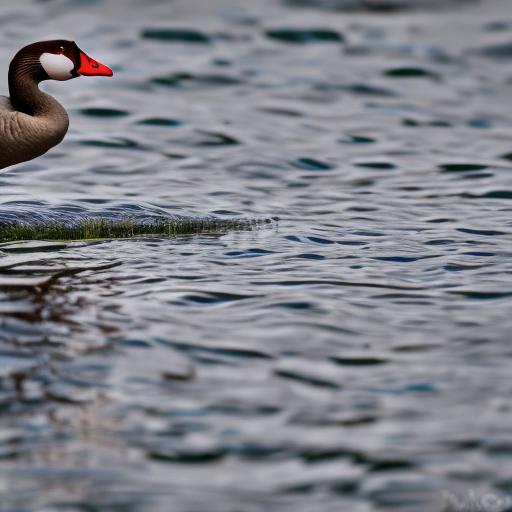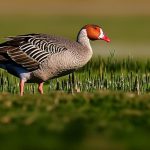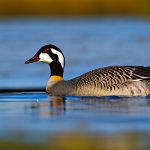Geese are known for their strong migratory instincts and their tendency to form strong family bonds. They are highly social birds and often travel in large flocks. Geese are also known for their territorial behavior, especially during the breeding season. They can become aggressive and protective of their nesting sites, which can lead to conflicts with humans.
Geese are also attracted to areas with abundant food sources, such as grassy lawns and bodies of water. They are herbivores and feed on a variety of plants, including grass, grains, and aquatic vegetation. This makes them particularly drawn to parks, golf courses, and other open spaces where they can find ample food.
Understanding the behavior of geese is crucial when it comes to implementing effective deterrent measures. By knowing what attracts geese and what triggers their territorial instincts, property owners can take proactive steps to discourage geese from settling in unwanted areas.
Key Takeaways
- Geese are territorial and protective of their nesting areas, so understanding their behavior is crucial in deterring them.
- Physical deterrents such as fencing, netting, and barriers can effectively prevent geese from accessing certain areas.
- Sound and visual deterrents like predator decoys, lasers, and distress calls can be used to scare off geese.
- Creating an unwelcoming environment through landscaping, removing food sources, and using repellents can discourage geese from staying.
- Establishing a routine of repellent measures such as regularly applying repellent sprays can help maintain a goose-free environment.
- Seeking professional assistance from wildlife control experts can provide effective and humane solutions for goose deterrence.
- Preventing future encounters with geese involves ongoing maintenance of deterrent measures and staying vigilant for any signs of geese returning.
Implementing Physical Deterrents
One of the most effective ways to deter geese from a property is by implementing physical deterrents. This can include installing fencing or barriers to prevent geese from accessing certain areas. For example, a low fence around a pond or lake can discourage geese from congregating in that area. Additionally, placing obstacles such as large rocks or shrubs near water features can make it more difficult for geese to access these areas.
Another physical deterrent that can be effective is the use of repellent sprays or gels. These products create an unpleasant surface for geese to walk on, which can discourage them from lingering in a particular area. Additionally, using decoys of natural predators, such as coyotes or dogs, can also deter geese from settling in an area.
By implementing physical deterrents, property owners can create barriers that make it more difficult for geese to access and settle in unwanted areas. This can help reduce the likelihood of conflicts between geese and humans.
Utilizing Sound and Visual Deterrents
In addition to physical deterrents, sound and visual deterrents can also be effective in discouraging geese from settling in unwanted areas. One common method is the use of scare devices, such as propane cannons or electronic noise makers, which emit loud noises at regular intervals to frighten geese away. These devices can be particularly effective in open spaces such as golf courses or parks.
Visual deterrents, such as reflective tape or balloons, can also be used to create an unwelcoming environment for geese. These visual cues mimic the presence of predators and can make geese feel threatened, prompting them to seek out safer areas. Additionally, using laser pointers or other light-based deterrents can also be effective in deterring geese from settling in specific areas.
By utilizing sound and visual deterrents, property owners can create an environment that is less attractive to geese. These methods can help reduce the likelihood of conflicts between geese and humans while also minimizing damage to property caused by geese.
Creating an Unwelcoming Environment
Creating an unwelcoming environment for geese is essential in deterring them from settling in unwanted areas. This can be achieved by modifying the landscape to make it less attractive to geese. For example, planting tall grasses or shrubs near bodies of water can create barriers that make it more difficult for geese to access these areas. Additionally, removing sources of food, such as spilled birdseed or unsecured garbage, can help discourage geese from congregating in specific locations.
Another effective method is to modify the terrain to make it less appealing to geese. For example, creating steep banks around bodies of water can make it more difficult for geese to access these areas. Additionally, using landscaping techniques such as hardscaping or gravel can create surfaces that are less attractive for geese to walk on.
By creating an unwelcoming environment for geese, property owners can reduce the likelihood of conflicts and damage caused by these birds. This proactive approach can help minimize the impact of geese on properties while also promoting a safer and more enjoyable environment for humans.
Establishing a Routine of Repellent Measures
Establishing a routine of repellent measures is crucial in maintaining a deterrent effect against geese. This can include regularly applying repellent sprays or gels to surfaces where geese are likely to settle, such as around bodies of water or on grassy areas. Additionally, regularly inspecting and maintaining physical deterrents, such as fences or barriers, can help ensure that they remain effective in deterring geese.
Incorporating regular maintenance of sound and visual deterrents is also important in maintaining their effectiveness. This can include adjusting the timing and frequency of scare devices to prevent geese from becoming accustomed to the noises. Additionally, regularly replacing or repositioning visual deterrents can help prevent geese from becoming desensitized to these cues.
By establishing a routine of repellent measures, property owners can maintain a consistent deterrent effect against geese. This proactive approach can help minimize conflicts and damage caused by geese while also promoting a more harmonious coexistence between humans and wildlife.
Seeking Professional Assistance

In some cases, seeking professional assistance may be necessary to effectively deter geese from a property. Wildlife management companies specialize in developing and implementing strategies to deter geese and other nuisance wildlife from settling in unwanted areas. These professionals have the expertise and resources to assess the specific needs of a property and develop customized deterrent plans that are tailored to the unique challenges posed by geese.
Professional assistance may also be necessary in situations where geese have become particularly aggressive or have caused significant damage to property. Wildlife management companies have the knowledge and experience to safely and humanely remove geese from properties while also implementing long-term deterrent measures to prevent future encounters.
By seeking professional assistance, property owners can benefit from the expertise and resources of wildlife management companies to effectively deter geese from their properties. This proactive approach can help minimize conflicts and damage caused by geese while also promoting a safer and more enjoyable environment for humans.
Preventing Future Encounters
Preventing future encounters with geese is essential in maintaining a deterrent effect over the long term. This can include implementing strategies to modify the landscape and make it less attractive to geese, such as planting tall grasses or shrubs near bodies of water or removing sources of food that attract geese. Additionally, regularly inspecting and maintaining physical deterrents, sound and visual deterrents, and repellent measures can help ensure that they remain effective in deterring geese.
Educating employees and visitors about the importance of not feeding wildlife can also help prevent future encounters with geese. Feeding wildlife can habituate them to human presence and encourage them to settle in unwanted areas. By promoting responsible behavior around wildlife, property owners can help minimize the likelihood of conflicts with geese.
By taking proactive steps to prevent future encounters with geese, property owners can maintain a consistent deterrent effect over the long term. This proactive approach can help minimize conflicts and damage caused by geese while also promoting a more harmonious coexistence between humans and wildlife.
In conclusion, understanding the behavior of geese is crucial in developing effective deterrent measures. By implementing physical deterrents, sound and visual deterrents, creating an unwelcoming environment, establishing a routine of repellent measures, seeking professional assistance, and preventing future encounters, property owners can effectively deter geese from settling in unwanted areas while promoting a safer and more enjoyable environment for humans.
Sure, here’s the paragraph with the related article included as an tag:
If you’re dealing with geese causing trouble on your boat, you may also be interested in learning how to convert a shed into a chicken coop. This article from Poultry Wizard provides valuable insights and tips on transforming a shed into a comfortable and functional space for your chickens. Check it out here.
FAQs
What are some effective methods to keep geese off a boat?
Some effective methods to keep geese off a boat include using visual deterrents such as scarecrows or reflective tape, using sound deterrents such as noise-making devices, and using physical barriers such as netting or fencing.
Are there any natural repellents that can be used to keep geese away from a boat?
Yes, there are natural repellents that can be used to keep geese away from a boat. These include planting tall grasses or shrubs around the boat to create a natural barrier, using predator decoys such as fake predators or predator calls, and using natural scents such as citrus or peppermint to deter geese.
Is it legal to use certain methods to keep geese off a boat?
It is important to check local regulations and laws regarding the use of certain methods to keep geese off a boat. Some methods, such as using noise-making devices, may be subject to local noise ordinances, while others, such as using physical barriers, may require permits or approval from local authorities.
What are the potential risks of having geese on a boat?
Having geese on a boat can pose several risks, including damage to the boat from their droppings, potential health hazards from their droppings, and the potential for aggressive behavior from the geese towards boat occupants.
Meet Walter, the feathered-friend fanatic of Florida! Nestled in the sunshine state, Walter struts through life with his feathered companions, clucking his way to happiness. With a coop that’s fancier than a five-star hotel, he’s the Don Juan of the chicken world. When he’s not teaching his hens to do the cha-cha, you’ll find him in a heated debate with his prized rooster, Sir Clucks-a-Lot. Walter’s poultry passion is no yolk; he’s the sunny-side-up guy you never knew you needed in your flock of friends!







